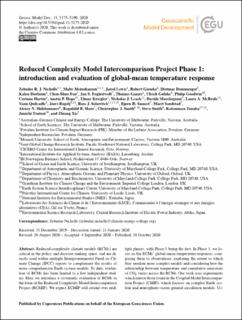| dc.description.abstract | Reduced-complexity climate models (RCMs) are critical in the policy and decision making space, and are directly used within multiple Intergovernmental Panel on Climate Change (IPCC) reports to complement the results of more comprehensive Earth system models. To date, evaluation of RCMs has been limited to a few independent studies. Here we introduce a systematic evaluation of RCMs in the form of the Reduced Complexity Model Intercomparison Project (RCMIP). We expect RCMIP will extend over multiple phases, with Phase 1 being the first. In Phase 1, we focus on the RCMs' global-mean temperature responses, comparing them to observations, exploring the extent to which they emulate more complex models and considering how the relationship between temperature and cumulative emissions of CO2 varies across the RCMs. Our work uses experiments which mirror those found in the Coupled Model Intercomparison Project (CMIP), which focuses on complex Earth system and atmosphere–ocean general circulation models. Using both scenario-based and idealised experiments, we examine RCMs' global-mean temperature response under a range of forcings. We find that the RCMs can all reproduce the approximately 1 ∘C of warming since pre-industrial times, with varying representations of natural variability, volcanic eruptions and aerosols. We also find that RCMs can emulate the global-mean temperature response of CMIP models to within a root-mean-square error of 0.2 ∘C over a range of experiments. Furthermore, we find that, for the Representative Concentration Pathway (RCP) and Shared Socioeconomic Pathway (SSP)-based scenario pairs that share the same IPCC Fifth Assessment Report (AR5)-consistent stratospheric-adjusted radiative forcing, the RCMs indicate higher effective radiative forcings for the SSP-based scenarios and correspondingly higher temperatures when run with the same climate settings. In our idealised setup of RCMs with a climate sensitivity of 3 ∘C, the difference for the ssp585–rcp85 pair by 2100 is around 0.23∘C(±0.12 ∘C) due to a difference in effective radiative forcings between the two scenarios. Phase 1 demonstrates the utility of RCMIP's open-source infrastructure, paving the way for further phases of RCMIP to build on the research presented here and deepen our understanding of RCMs | |
